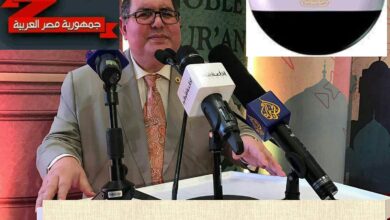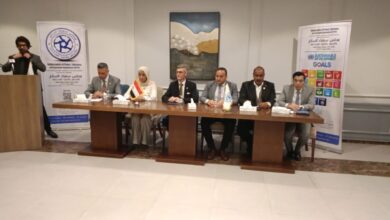وزيرة الهجرة: نعمل على تدشين تطبيق "المصريين بالخارج" يتضمن كل المحفزات والمبادرات
At the invitation of the Information, Support and Decision Center of the Council of Ministers, Ambassador Soha Gendi, Minister of State for Immigration and Egyptian Affairs Abroad, participated as a keynote speaker in a workshop held on Monday, October 23, at the center’s headquarters in the New Administrative Capital, entitled “Enhancing Remittances from Egyptians Working Abroad,” in the presence of Mr. Osama Al-Gohary, Assistant Prime Minister and Head of the Information Center for Support and Decision Making, Professor Sarah Nabil, Assistant Minister of Immigration for Economic Affairs, and a group of representatives of government agencies, experts, and representatives of Egyptians abroad, as part of the activities of the workshops of the “We Think for Our Country: 50 Ideas to Enhance Competitiveness” initiative. The Egyptian Economy,” which was launched by the Center’s Public Policy Forum, in cooperation with UNICEF.
At the beginning, Osama El-Gohary welcomed Ambassador Soha Gendy, who honored the Center with this visit and this participation, which confirms Her Excellency’s keenness to hear the ideas of Egypt’s youth and learn about their vision of how to enhance remittances from Egyptians abroad, which they presented within the “We Think for Our Country” initiative launched by the Public Policy Forum, which is the result of One of the fruits of the Information Center’s continuous effort is to implement the directives of the Prime Minister to open channels of communication with young researchers. In this context, the Center has coordinated with 24 government universities; To organize summer training, prepare laboratories for the future, and organize debates, about 550 young people have been trained so far.
Al-Gawhary added that the Public Policy Forum was concerned with training young researchers to prepare policy papers, and holding scientific competitions to distinguish those who excelled in presenting innovative ideas, and the goal of the Forum initiative “We Think for Our Country” is to come up with fifty ideas to enhance the competitiveness of the Egyptian economy. In preparation for presenting them to the Prime Minister, noting that policy papers prepared by researchers are subject to arbitration by a group of experts.
At the beginning of her speech, the Minister of Immigration praised the vital role played by remittances from Egyptians abroad in supporting the national economy. It is considered one of the most important sources of providing hard currency in the country, alongside other sources such as the Suez Canal, tourism revenues, and exports.
In a presentation, Ambassador Soha Gendi reviewed the study prepared by the Ministry regarding the development of remittances from Egyptians abroad, providing a detailed presentation on the reasons for the increase in remittances in years and their decrease in other years in detail over the past ten years and the reasons leading to that. She also addressed all investment incentives allocated to Egyptians abroad. , which is related to their priorities in terms of the services they need that are collected in hard currency, and the alternatives for transfer mechanisms in their modern patterns and forms and not the usual direct method of transfer, noting that Egypt is the sixth largest country with the highest percentage of remittances from its children abroad to the homeland, as the Minister indicated. The Indian model, whose citizens abroad top the list of hard currency transfers to their country, making it the first country on the list of countries with the most currency transfers from its citizens. It also discussed a number of modern typical forms that India has introduced to benefit from the transfers of its citizens abroad, pointing out that many Some of these modern patterns are already being followed and worked on in Egypt, and there are more that can be benefited from the Indian experience.
The Minister of Immigration also reviewed the most prominent initiatives that attract investments by Egyptians abroad, including the car initiative for Egyptians abroad, the “Bokra” pension in dollars, the settlement of conscription status, and investment certificates for Egyptians abroad, as well as the services provided to Egyptians abroad, who number about 14 million Egyptians.
Ambassador Soha Gendy reviewed the development of remittances from Egyptians abroad, as the highest percentage of remittances came in the year 2021/2022, reaching $31.9 billion, after $17.1 billion in 2015/2016, and the impact of floating the Egyptian pound, in addition to the start of implementing the National Economic Reform Program, and the availability of a package. From economic reforms, remittances reached $26.39 billion in 2017/2018, with the improvement of national economic indicators. In 2018/2019, remittances decreased for several reasons, including Egyptians transferring large sums of money after the flotation, and in 2019/2020 they reached $27.75 billion, until… It reached $31.4 billion in 2020/2021, and then $31.9 billion in 2021/2022 with the outbreak of the Corona epidemic, the return of many Egyptians abroad, the emergence of labor resettlement, the Russian-Ukrainian war, pressure on gas, and the impact of factories.
Ambassador Soha Gendi added that in the year 2022/2023, transfers amounted to $22.1 billion due to the decrease in salaries and the increase in inflation, and then the costs of living and spending priorities, in addition to the parallel market and what is known as the “clearing method,” by obtaining hard currency from Egyptians abroad outside the banking system in exchange for receiving money. To their families at home, which affects the cash reserve.
Ambassador Soha Gendy indicated that the Ministry has put forward many initiatives to enhance remittances by Egyptians abroad, including dollar certificates with a competitive return of 7% and 9%, which is the highest return in the world, in addition to encouraging Egyptians abroad to open dollar accounts in branches of national banks abroad, as well as the Egyptian Cars Initiative. Abroad, which has been activated again and can now be used by Egyptians abroad.
The Minister of Immigration added that a company for Egyptian investments abroad will be launched. In response to their demands at the Egyptians Abroad Conference, where several meetings were held with representatives of Egyptian ministries and state institutions, which reflects the state’s interest in creating an investment climate and facilitating the business environment to attract more foreign and local investments, achieve positive results to support the national economy, and provide full support for the company to begin its work in The Egyptian market to attract Egyptian and international investments to start work in the Egyptian market, and a protocol was signed with the initials of the group of Egyptian investors abroad who founded the company.
The Minister of Immigration explained that the Egyptian state has opened the door to its citizens residing abroad who face a problem with their conscription status that prevents them from returning to their homeland, or the inability to leave it again if they return due to their request for conscription, and they can now settle their situation.
In addition to launching the campaign “Investors Abroad Answer: Why Invest in Egypt,” to shed light on the attractive factors and promising investment opportunities that characterize the Egyptian market in various fields in light of the development process that is taking place, providing infrastructure at the highest level, and taking measures that will facilitate… For investors, including the establishment of a unit headed by the Prime Minister to solve investors’ problems. In addition, the campaign includes short videos in which our Egyptian experts abroad present their testimonies about investment in Egypt.
Ambassador Soha Gendy stressed that attention to the human element and its development is an important aspect of the reasons for the increase in remittances from workers abroad in some countries around the world. It reached more than $100 billion in India, for example, reviewing India’s experience in this regard. Therefore, the Egyptian-German Center for Jobs, Immigration and Reintegration was launched to provide training and qualification.
The Minister of Immigration also indicated that the Ministry is working on launching the “Egyptians Abroad” application to include the various incentives that were set for them, in cooperation with the Ministry of Communications and Information Technology.
From the Egyptian Foreign Ministry, Mr. Al-Husseini Khaled, Second Secretary at the Ministry of Foreign Affairs, attended the workshop. He began by thanking the Information Center for inviting the Egyptian Foreign Ministry to participate in this workshop. He stressed that we constantly need such workshops to enhance the competitiveness of the Egyptian economy, and he looked forward to reaching through them ideas that would achieve A tangible increase in remittances from Egyptians abroad. He stressed that the Ministry of Foreign Affairs, for its part, is dealing within the framework of a comprehensive vision aimed at providing the best services for this category, whether through usual consular work or by overcoming the obstacles that Egyptians may face in the labor market in some countries, in addition to studying new labor markets so that the Egyptian state can By opening it to the Egyptian citizen, which will lead to an increase in remittances from Egyptians abroad.
During the workshop, the attendees followed a presentation by Dr. Mai Mohsen, Director of the General Administration of the Technical Office at the Information Center, highlighting the stages of development of workers’ remittances in Egypt on a monthly and annual basis, the most important reasons for the decline in the volume of remittances, and the most prominent measures taken by the state to enhance and attract workers’ remittances abroad. It also provided an overview of the ideas proposed in the axis of workers’ remittances abroad in the “We Think for Our Country” initiative.
Then, Lara Dhaif, the media coordinator of the “We Think for Our Country” initiative and the workshop director, provided the opportunity for a number of researchers to present the most important policy papers they had proposed in the axis of enhancing remittances from Egyptians working abroad, which address: amending the procedures for settling the conscription situation, amending the conditions of the housing initiatives offered to Egyptians abroad, and amending the law. Insurance, creating a system of incentives to encourage Egyptians to transfer money, motivating Egyptians abroad to invest in Egypt, launching real estate financing initiatives, and finally building a national database for Egyptians abroad.
Among the Egyptians in the Emirates, Dr. Suzan Al-Masah, Professor of Economics at Cairo and Zayed Universities and Director of the Sustainability Program at Zayed University, spoke. She initially expressed her pride in participating in this workshop, and thanked the Minister for providing the opportunity to present the experiences of Egyptians working abroad according to their experiences regarding opportunities to increase remittances through… The legitimate official channels, and she believed that the matter begins with transparency, reassurance, and motivation. This prompts every Egyptian abroad to think about the national interest alongside the personal interest, and achieve a return with the least amount of risks. That is, away from the black market, while ensuring the ease of recovering money when deposited as dollar deposits. In this context, I proposed developing digital transfer systems and wallets to transfer money easily and safely, and also providing a competitive exchange rate for Egyptians working abroad only, in addition to savings vessels in dollars.
Also from the Emirates, Dr. Amal Saqr, a political researcher who has been evaluating abroad for 22 years, spoke, stressing firstly the necessity of continuing propaganda for the importance of sending financial transfers to Egyptians abroad through legitimate channels. She then pointed to several matters that would increase the revenues obtained from Egyptians abroad, including allowing all civil registry transactions to be carried out within Egyptian embassies for higher fees and in hard currency, and also continuing to provide the initiative to purchase cars for Egyptians abroad, and facilitating dealing with bank accounts in banks in Egypt for Egyptians while they are abroad. Providing travel tickets to Egyptians from EgyptAir at a competitive price compared to other companies, and launching initiatives to encourage tourism for Egyptians.
In conclusion, Saqr presented what she called “soft communication” between Egypt and Egyptians abroad, which is through cultural events in general, even if she specifically mentioned Arab music concerts, explaining that the cost of such events is not great, but their return is huge.



